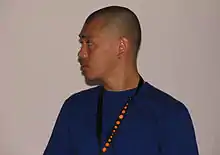Hiroaki Umeda
Hiroaki Umeda, né le [réf. nécessaire], est un danseur, chorégraphe, et plasticien japonais de danse contemporaine. Il est marié et vit avec son enfant au Japon.

| Naissance |
Japon |
|---|---|
| Lieux de résidence | Tokyo |
| Activité principale | Danseur et chorégraphe |
| Style | Danse contemporaine |
| Activités annexes | Vidéaste |
| Site internet | http://hiroakiumeda.com |
Biographie
Hiroaki Umeda is a choreographer and a multidisciplinary artist now recognized as one of the leading figures of the Japanese avant-garde art scene. Since the launch of his company S20, his subtle yet violent dance pieces have toured around the world to audience and critical acclaim. His work is acknowledged for the highly holistic artistic methodology with strong digital back ground, which considers not only physical elements as dance, but also optical, sonal, sensorial and, above all, spatiotemporal components as part of the choreography. Based on his profound interest in choreographing time and space, Umeda has spread his talent not only as a choreographer and dancer, but also as a composer, lighting designer, scenographer and visual artist.
Born in Tokyo, 1977, Umeda first studied photography at the Nihon University in Tokyo. At the age of 20, he gained interest in art more suitable for creating intense bodily experiences, which he is now known for, and started attending numerous dance lessons such as ballet, hip-hop, modern dance and so on. After about a year, in 2000, Umeda stopped taking lessons, founded his company, S20, and started creating his own multidisciplinary works by freely integrating all distinct dance practices and other art forms. In 2002, his ever popular work, while going to a condition, received great acclaim at Yokohama Dance Collection R (Yokohama, Japan) and was immediately invited to Rencontres Choréographiques Internationales (Paris). Director Anita Mathieu hailed the piece as ’a visual and sensorial experience. [...] The discovery of a young artist, both original and promising.’
In 2007, his new solo piece Accumulated Layout premiered in the prestigious Théâtre National de Chaillot with much anticipation, which resulted in a sell-out performance and another great acclaim. Drawing further from his now signature style of mixing digital imagery, minimal soundscape and extremely potent corporeality, Umeda’s other solo works such as Adapting for Distortion (2008), Haptic (2008), Holistic Strata (2011) and split flow (2013) has transfixed the audience in major festivals and theatres worldwide such as Festival d’Automne (Paris), Pompidou Centre (Paris), Biennale de la Danse (Lyon), Kunstenfestivaldesarts (Brussel), Festival Roma Europa (Rome), Tanz im August (Berlin), Tanzquartier (Vienna), NY Live Art (New York), The Barbican Center (London), Sydney Opera House (Sydney), National Chiang Kai-Shek Cultural Center, R.O.C (Taipei) and Aichi Triennale (Aichi). One of his most successful pieces, Holistic Strata, co-produced by the Yamaguchi Center for Arts and Media (Yamaguchi, Japan), which Umeda calls as a ‘kinetic installation’ has seamlessly assimilated the boundary between dance and visual art. Later it was credited by Le Monde as, not an one-man show, but as an ‘one man dancing landscape.’
In 2009, Umeda commenced his ten-year choreographic project ’Superkinesis’ and started working with dancers of distinct physical backgrounds such as contemporary dancers (1.centrifugal, 2009), hip-hop dancers (2. repulsion, 2010), classical ballet dancers (3. isolation, 2011) and Asian traditional dancers (4. temporal pattern, 2013). From the outset, Umeda’s minimal and innovative choreography style which harmonizes his singular physical language and the different dancers’ bodies has gained great attention and most pieces have been commissioned by important organizations such as Théâtre de Suresnes Jean Vilar (2. repulsion), Hebbel am Ufer (3. isolation) and Esplanade Theatre, National Chiang Kai-Shek Cultural Center, R.O.C and Aichi Triennale (4. temporal pattern), In ‘Superkinesis’, Umeda ventures into discovery of kinetic movements innate to human beings, preceding the construction of cosmetic choreographic languages, and, subsequently, attempts to construct a transcendental (super) order in the space and time of the stage per se. In this series of choreographic experiment, Umeda considers dancers’ bodies as natural objects constantly affected by the natural force, and explores to discover kinetic languages by tuning into the subtle voices of the surrounding environment that only could be perceived by an acute sensorial receptor called dancers.
GötenborgsOperans Danskompani, Sweden has commissioned Umeda’s latest choreography piece, Interfacial Scale (2013), created for 11 dancers and an abstract orchestral music composed by Yoshihiro Hanno. Fresh from the show’s success, his latest choreographic piece Peripheral Stream (2014) was premiered at Théâtre Châtelet in March 2014, commissioned by the L.A Dance Project lead by Benjamin Millepied.
Extending from his interest in providing an unknown sensorial experience to the audience, from 2010, Umeda has been working on series of installations, which mainly focus on optical illusion and physical immersion. The main works include Haptic (installation) (2010) commissioned by Aichi Triennale, Holistic Strata (installation) (2011) premiered at Exposition EXIT at Maison des arts de Créteil, and split flow (installation) (2012) commissioned by the Van Abbemuseum of Eindhoven. His string of works combining visual and physical sensation has earned him Prix Ars Electronica, Honorary Mention, in 2010.
Principales chorégraphies
- 2002 : while going to a condition
- 2003 : Finore
- 2007 : Accumulated Layout
- 2008 : Adapting for Distortion pour le Festival Roma Europa
- 2008 : Haptic pour le Festival d'automne à Paris
- 2009 : 1.Centrifugal
- 2010 : 2.Repulsion pour Suresnes Cité Danse
- 2011 : Holistic Strata
- 2011 : 3.Isolation pour le Festival « Tanz im August » de Berlin
- 2013:split flow
- 2013 : 4.Temporal Pattern pour le Chiang Kai-Shek Theatre de Taipei
- 2013 : Interfacial Scale pour le GöteborgsOperans Danskompani de Gothenburg
- 2014 : Peripheral Stream pour le L.A. Dance Project de L.A.
- 2015:Intensional Particle